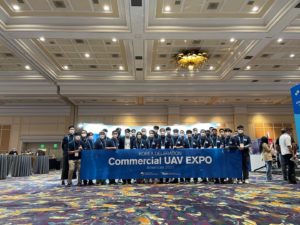
Korean technology is known around the world, with large companies like Hyundai, Samsung, LG, and Kia among the top automotive and tech providers around the globe. Korean drones are entering the global market quickly, supported by generous grants to support innovation, regulatory flexibility, and government-funded testing facilities. As the U.S. government turns away from China-made tech, the Korean industry is ready to take advantage of the opportunity that a growing market provides.
Kyung Shin, Deputy Director of MOLIT, says that the Korean innovation economy provides the perfect environment for developing the drone industry. “Korean technology is very advanced, and drone technology reflects the resources found in the Korean high tech industry,” says Ms. Shin. “It’s not just about flying the drone; but about systems integration, software, infrastructure, and anti-drone systems. There is a very diverse representation from the Korean team.”
Government support for the nascent drone industry goes beyond simple exposure to the larger high tech ecosystem. Korea limits the participation of larger companies in the drone industry currently, in order to support start-ups.
“The Korean government is trying to protect the small and medium sized industry so that smaller companies have a chance to grow and innovate. We provide a lot of grants for research and technology, and funding for companies to help brand themselves in the global market,” explains Hyungseok Kim, Senior Researcher at MOLIT.
In addition to that protection, Korean drone companies have access to government supported sandbox and testing areas, including the opportunity to test Korean drones in an urban environment. “Aviation law is estricted, but the “sandbox” bridges the gap between the real world and the test environment,” says Ms. Shin. “Aerodrone city” is a program that allows local governments to participate and support local businesses by allowing them to test drone technology in the urban environment: between the liberal sandbox environment and urban opportunities, Korean drone companies are able to test advanced operations in real-world environments quickly and relatively easily.
Andrew Cho is the U.S. representative for Hojung Solutions, an infrastructure engineering firm representing the UCon REMO-M drone. Hojung has completed projects from Africa to Afghanistan and beyond with the REMO-M.
“MOLIT supports a lot of global undertakings, and most of the companies here have had the opportunity to participate with these projects. The companies here have proven their technology around the world,” says Cho.
“The Korean government plays a big role in nurturing small and medium sized companies – through programs such as the sandbox, the Smart City program, and more,” Cho says. “The government is very proactive about supporting the drone industry, and that’s providing a great driving force.”
Miriam McNabb is the Editor-in-Chief of DRONELIFE and CEO of JobForDrones, a professional drone services marketplace, and a fascinated observer of the emerging drone industry and the regulatory environment for drones. Miriam has penned over 3,000 articles focused on the commercial drone space and is an international speaker and recognized figure in the industry. Miriam has a degree from the University of Chicago and over 20 years of experience in high tech sales and marketing for new technologies.
For drone industry consulting or writing, Email Miriam.
TWITTER:@spaldingbarker
Subscribe to DroneLife here.